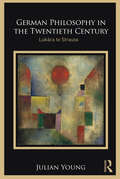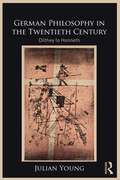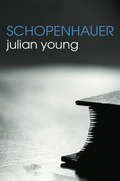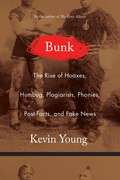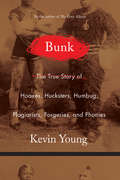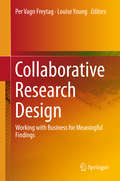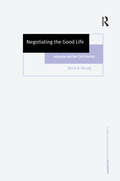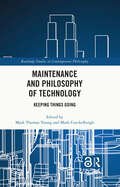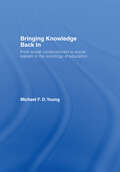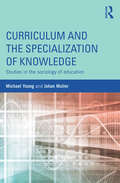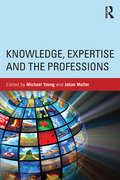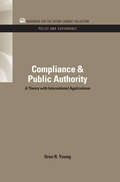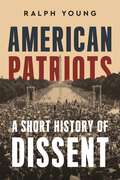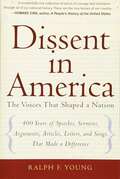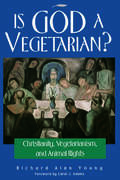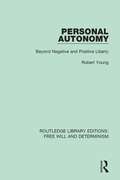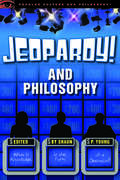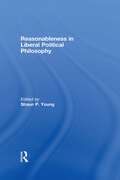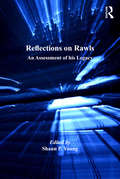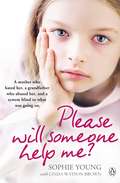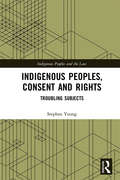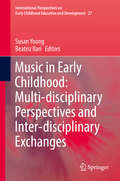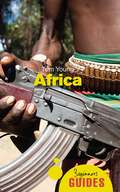- Table View
- List View
German Philosophy in the Twentieth Century: Lukács to Strauss
by Julian YoungThe course of German philosophy in the twentieth century is one of the most exciting and controversial in the history of human thought. In this outstanding and engaging introduction, a companion volume to his German Philosophy in the Twentieth Century: Weber to Heidegger, Julian Young examines and assesses the way in which some of the major German thinkers of the period reacted, often in starkly contrasting ways, to the challenges posed by the nature of modernity, the failure of liberalism and the concept of decline. Divided into two parts exploring major intellectual figures of the left and right respectively, Young introduces and assesses the thought of the following figures: Georg Lukács: the critique of capitalism: alienation, reification, and false consciousness Ernst Bloch: the Marxist utopia Walter Benjamin: the confluence of phenomenology and left-wing thought: the Arcades Project, aura, and the technological reproduction of the artwork Oswald Spengler: the pessimistic right and the concept of Western decline Max Scheler: Catholic conservatism and the ‘objective hierarchy of values’ Carl Schmitt: the failure of liberalism, dictatorship, ‘friends’ versus ‘enemies’ Leo Strauss: the rejection of moral relativism and the return to classical philosophy. Highly relevant when the viability of liberal democracy is again called into question, German Philosophy in the Twentieth Century: Lukacs to Strauss is essential reading for students of German philosophy, phenomenology and critical theory, and will also be of interest to students in related fields such as literature, religious studies, and political theory.
German Philosophy in the Twentieth Century: Dilthey to Honneth
by Julian YoungThe path taken by German philosophy in the twentieth century is one of the most exciting and controversial in the history of human thought, by turns radical and conservative and secular and religious. In this outstanding introduction, German Philosophy in the Twentieth Century: Dilthey to Honneth—the third and final volume in his trilogy—Julian Young examines the work of eight German philosophers and theologians of the period. He discusses their engagement with the deepest existential questions, their critique of the rationalization and mechanization of modernity, and their commitment to varying forms of liberalism, socialism, and democracy. Young introduces and assesses the thought of the following figures: Wilhelm Dilthey: the need for ‘worldviews’, and the distinction between ‘explanation’ and ‘understanding’ as a bulwark against the reduction of human beings to scientific quanta Karl Jaspers: existentialism, the challenge of nihilism, and the turn to theology Edith Stein: the phenomenology of empathy, community versus society, and the turn to Catholicism Paul Tillich: philosophical theology and the ‘theonomous’ life Martin Buber: recovering the ‘thou’ in the face of modernity’s reduction of everything to an ‘it’; the kibbutz as the paradigm of a socialist community Hans Jonas: the mortal threat posed by the unknown consequences of modern technology and the ethics of responsibility for the planet Erich Fromm: the ‘art of loving’ as a bulwark against hard and soft totalitarianism; the replacement of capitalism by communitarian socialism Axel Honneth: contemporary Hegelianism and the ethics and politics of recognition; the nature of real freedom. Lucidly and engagingly written, German Philosophy in the Twentieth Century: Dilthey to Honneth is essential reading for students of German philosophy, phenomenology, and theology and will also be of interest to students in related fields such as literature, political theory, and sociology. German Philosophy in the Twentieth Century: Weber to Heidegger (2018) and German Philosophy in the Twentieth Century: Lukács to Strauss (2020) are also available from Routledge.
Individual and Community in Nietzsche's Philosophy
by Julian YoungAccording to Bertrand Russell, Nietzsche's only value is the flourishing of the exceptional individual. The well-being of ordinary people is, in itself, without value. Yet there are passages in Nietzsche that appear to regard the flourishing of the community as a whole alongside, perhaps even above, that of the exceptional individual. The ten essays that comprise this volume wrestle with the tension between individual and community in Nietzsche's writings. Some defend a reading close to Russell's. Others suggest that Nietzsche's highest value is the flourishing of the community as a whole and that exceptional individuals find their highest value only in promoting that flourishing. In viewing Nietzsche from the perspective of community, the essays also cast new light on other aspects of his philosophy, for instance, his ideal of scientific research and his philosophy of language.
Nietzsche's Philosophy of Religion
by Julian YoungIn this 2006 book, Julian Young argues that Nietzsche's early religious communitarianism persists through all his published works.
Schopenhauer: A Study In The Philosophy Of Arthur Schopenhauer (The Routledge Philosophers)
by Julian YoungArthur Schopenhauer (1788-1860) was one of the greatest writers and German philosophers of the nineteenth century. His work influenced figures as diverse as Wagner, Freud and Nietzsche. Best known as a pessimist, he was one of the few philosophers read and admired by Wittgenstein.In this comprehensive introduction, Julian Young covers all the main aspects of Schopenhauer's philosophy. Beginning with an overview of Schopenhauer's life and work, he introduces the central aspects of his metaphysics fundamental to understanding his work as a whole: his philosophical idealism and debt to the philosophy of Kant; his attempt to answer the question of what the world is; his account of science; and in particular his idea that 'will' is the essence of all things.Julian Young then introduces and assesses Schopenhauer's aesthetics, which occupy a central place in his philosophy. He carefully examines Schopenhauer's theories of the sublime, artistic genius and music, before assessing his ethics of compassion, his arguments for pessimism and his account of 'salvation'. In the final chapter, he considers Schopenhauer's legacy and his influence on the thought of Nietzsche and Wittgenstein, making this an ideal starting point for those coming to Schopenhauer for the first time.
Bunk: The Rise of Hoaxes, Humbug, Plagiarists, Phonies, Post-Facts, and Fake News
by Kevin YoungYoung finds that faker is woven from stereotype and suspicion, race being the most insidious American hoax of all.
Bunk: The Rise of Hoaxes, Humbug, Plagiarists, Phonies, Post-Facts, and Fake News
by Kevin YoungLonglisted for the National Book Award for Nonfiction“There Kevin Young goes again, giving us books we greatly need, cleverly disguised as books we merely want. Unexpectedly essential.”—Marlon JamesAward-winning poet and critic Kevin Young tours us through a rogue’s gallery of hoaxers, plagiarists, forgers, and fakers—from the humbug of P. T. Barnum and Edgar Allan Poe to the unrepentant bunk of JT LeRoy and Donald J. Trump. Bunk traces the history of the hoax as a peculiarly American phenomenon, examining what motivates hucksters and makes the rest of us so gullible. Disturbingly, Young finds that fakery is woven from stereotype and suspicion, race being the most insidious American hoax of all. He chronicles how Barnum came to fame by displaying figures like Joice Heth, a black woman whom he pretended was the 161-year-old nursemaid to George Washington, and What Is It?, an African American man Barnum professed was a newly discovered missing link in evolution.Bunk then turns to the hoaxing of history and the ways that forgers, plagiarists, and journalistic fakers invent backstories and falsehoods to sell us lies about themselves and about the world in our own time, from pretend Native Americans Grey Owl and Nasdijj to the deadly imposture of Clark Rockefeller, from the made-up memoirs of James Frey to the identity theft of Rachel Dolezal. In this brilliant and timely work, Young asks what it means to live in a post-factual world of “truthiness” where everything is up for interpretation and everyone is subject to a pervasive cynicism that damages our ideas of reality, fact, and art.
Collaborative Research Design: Working with Business for Meaningful Findings
by Louise Young Per Vagn FreytagThis book articulates and interconnects a range of research methods for the investigation of business management processes. It introduces new directions that both recognise the business community as stakeholders in the research process and seek to include them in that process. The book presents a range of contemporary research methods with particular focus on those that allow insights into business managers' thoughts and behaviours. It includes fresh views on traditional research designs, for example new approaches to using literature reviews, experiments, interviews and observation studies. It also considers cutting-edge research methods, such as the use of vignettes, workshops, improvisation and theatre, as well as computer-based simulation. In addition to discussing new approaches to data capture and data generation, it presents new methods of data analysis by considering various forms of models and modelling, new forms of computer-aided text analysis and innovative approaches to data display. Finally, the book provides a link between the philosophical underpinnings of research and the different research methods presented. This is often neglected but undertaking the knowledge-generating journey that is research includes having a view on reality and marrying this to beliefs about how the reality to be investigated can be best expedited.
Negotiating the Good Life: Aristotle and the Civil Society (Ashgate New Critical Thinking in Philosophy)
by Mark A. YoungFor centuries philosophers have wrestled with the dichotomy between individual freedom on the one hand and collective solidarity on the other. Yet today there is a growing realization that this template is fundamentally flawed. In this book, Mark Young embraces and advocates a more holistic concept of freedom; one which is not merely defined negatively but which positively provides the preconditions for individuals to actively exercise their autonomy and to flourish as human beings in the process. Young posits the idea of 'freedom in community' and traces its origin back to Aristotle. Taking as his premise that humans are deeply social beings who live their lives intricately interwoven with each other, he examines what type of political community is relevant for us in this post-Classical, post-Enlightenment and, indeed, post-Existential world. Identifying the failure of traditional 'statist' models of politics, Young instead argues for a civil society: a globally interlinked and free set of liberal communities as the best context for nourishing human flourishing. In this way we can achieve a proper setting for Eudaimonia in a modern sense.
Maintenance and Philosophy of Technology: Keeping Things Going (Routledge Studies in Contemporary Philosophy)
by Mark Thomas Young Mark CoeckelberghWhat can we learn about the nature of technology by studying practices of maintenance and repair? This volume addresses this question by bringing together scholarship from philosophers of technology working at the forefront of this emerging and exciting topic.The chapters in this volume explore how attending to maintenance and repair can challenge and complement existing ways of thinking about technology focused on use and design and introduce new philosophical perspectives on the relationship between technology, time and human practice. They examine the significance of maintenance and repair practices at different scales in relation to a diverse range of philosophical traditions and a wide variety of technologies, from urban infrastructure such as bridges and buildings to data technologies such as servers and software systems. Together, the contributions highlight common themes in the philosophical study of maintenance, including the role of skill, the significance of social values and the potential of these practices to transform the technologies to which they are applied. By reflecting on the different ways in which we keep technologies going, from the devices we use in our homes to the large technical systems which surround us, this volume reveals the philosophical significance of practices of maintenance, not only as a source of new insights but also as a resource for enriching our understanding of a variety of existing topics in philosophy.Maintenance and Philosophy of Technology will appeal to scholars and advanced students working in philosophy of technology, philosophy of engineering and science & technology studies.Chapter 9 of this book is freely available as a downloadable Open Access PDF at www.taylorfrancis.com under a Creative Commons Attribution-Non Commercial-No Derivatives (CC-BY-NC-ND) 4.0 license.
Bringing Knowledge Back In: From Social Constructivism to Social Realism in the Sociology of Education
by Michael Young'This book tackles some of the most important educational questions of the day... It is rare to find a book on education which is theoretically sophisticated and practically relevant: this book is.' From the Foreword by Hugh Lauder What is it in the twenty-first century that we want young people, and adults returning to study, to know? What is it about the kind of knowledge that people can acquire at school, college or university that distinguishes it from the knowledge that people acquire in their everyday lives everyday lives, at work, and in their families? Bringing Knowledge Back In draws on recent developments in the sociology of knowledge to propose answers to these key, but often overlooked, educational questions. Michael Young traces the changes in his own thinking about the question of knowledge in education since his earlier books Knowledge and Control and The Curriculum of the Future. He argues for the continuing relevance of the writings of Durkheim and Vygotsky and the unique importance of Basil Bernstein’s often under-appreciated work. He illustrates the importance of questions about knowledge by investigating the dilemmas faced by researchers and policy makers in a range of fields. He also considers the broader issue of the role of sociologists in relation to educational policy in the context of increasingly interventionist governments. In so doing, the book: provides conceptual tools for people to think and debate about knowledge and education in new ways provides clear expositions of difficult ideas at the interface of epistemology and the sociology of knowledge makes explicit links between theoretical issues and practical /policy questions offers a clear focus for the future development of the sociology of education as a key field within educational studies. This compelling and provocative book will be essential reading for anyone involved in research and debates about the curriculum as well as those with a specific interest in the sociology of education.
Curriculum and the Specialization of Knowledge: Studies in the sociology of education
by Michael Young Johan MullerThis book presents a new way for educators at all levels - from early years to university - to think about curriculum priorities. It focuses on the curriculum as a form of specialised knowledge, optimally designed to enable students to gain access to the best knowledge available in any field. Papers jointly written by the authors over the last eight years are revised for this volume. It draws on the sociology of knowledge and in particular the work of Emile Durkheim and Basil Bernstein, opening up the possibilities for collaborative inter-disciplinary enquiry with historians, philosophers and psychologists. Although primarily directed to researchers, university teachers and graduate students, its arguments about specialised knowledge have profound implications for policy makers.
Knowledge, Expertise and the Professions
by Michael Young Johan MullerIt has long been recognised that specialised knowledge is at the core of what distinguishes professions from other occupations. The privileged status of professions in most countries, however, together with their claims to autonomy and access to specialised knowledge, is being increasingly challenged both by market pressures and by new instruments of accountability and regulation. Established and emerging professions are increasingly seen as either the solution, or as sources of conservatism and resistance to change in western economies, and recent developments in professional education draw on a competence model which emphasises what newly qualified members of a profession ‘can do’ rather than what ‘they know’. This book applies the disciplines of the sociology of knowledge and epistemology to the question of professional knowledge. What is this knowledge? It goes beyond traditional debates between ‘knowing how’ and ’knowing that’, and ‘theory’ and ‘practice’. The chapters cover a wide range of issues, from discussions of the threats to the knowledge base of established professions including engineers and architects, to the fraught situations faced by occupations whose fragile knowledge base and professional status is increasingly challenged by new forms of control. While recognising that graduates seeking employment as members of a profession need to show their capabilities, the book argues for reversing the trend that blurs or collapses the skill/knowledge distinction. If professions are to have a future then specialised knowledge is going to be more important than ever before. Knowledge, Expertise and the Professions will be key reading for students, researchers and academics in the fields of professional expertise, further education, higher education, the sociology of education, and the sociology of the professions.
Compliance & Public Authority: A Theory with International Applications (RFF Policy and Governance Set)
by Oran R. YoungOffers a theory of compliance and authority that wouild be applicable to behavior concerning economic contracts, law, enforcement, and international relations. It examiones the problem of compliance in centralized (e.g. national and state laws) and decentralized (international treaties) systems. Applies the theory to explain the level of compliance with Partial Nuclear Test Ban Treaty anf the International North Pacific Fisheries Convention. Originally published in 1979
American Patriots: A Short History of Dissent
by Ralph YoungA concise history that proves that dissent is patrioticThe history of America is a history of dissent. Protests against the British Parliament’s taxation policies led to the American Revolution and the creation of the United States. At the Constitutional Convention the founders put the right to protest in the First Amendment of the Bill of Rights. In the nineteenth century, dissenters protested against the War of 1812 and the Mexican War, they demanded the abolition of slavery, suffrage for women, and fair treatment for workers. In the twentieth century, millions of Americans participated in the Civil Rights Movement, the antiwar movement, and second-wave feminism. In the twenty-first century, hundreds of thousands protested the war in Iraq, joined the 2011 Occupy movement, the 2017 Women’s March, and the 2020 Black Lives Matter uprisings. The crowds grew larger than ever, but the sentiments expressed were familiar. There have been dissenting Americans for as long as there has been an America.In American Patriots, historian Ralph Young chronicles the key role dissent has played in shaping the United States. He explains that activists are not protesting against America, but pushing the country to live up to its ideals. As he guides the reader through the history of protest, Young considers how ordinary Americans, from moderates to firebrands, responded to injustice. He highlights the work of organizations like SNCC and ACT UP, and he follows iconic individuals like Ida B. Wells-Barnett and Woody Guthrie, charting the impact of their dissent. Some of these protesters are celebrated heroes of American history, while others are ordinary people, frequently overlooked, whose stories show that change is often accomplished through grassroots activism.Yet not all dissent is equal. In 2021, thousands of rioters stormed the US Capitol, and Americans on both sides of the aisle watched the destruction with horror. American Patriots contrasts this attack with the long history of American protest, and challenges us to explore our definition of dissent. Does it express a legitimate grievance or a smokescreen for undermining democracy? What are the limits of dissent? Where does dissent end and sedition begin?In a time when legitimate dissent is framed as unpatriotic, Young reminds us of the dissenters who have shaped our country’s history. American Patriots is a necessary defense of our right to demand better for ourselves, our communities, and our nation.
Dissent In America: Voices That Shaped A Nation
by Ralph F. YoungThis collection of primary sources presents the story of US History as told by dissenters who, throughout the course of American history, have fought to gain rights they believed were denied to them or others, or who disagree with the government or majority opinion. Each document is introduced by placing it in its historical context, and thought-provoking questions are provided to focus the student when s/he reads the text. Instructors are at liberty to choose the documents that best highlight a theme they wish to emphasize.
Is God a Vegetarian?
by Richard Alan YoungIs God a Vegetarian? is one of the most complete explorations of vegetarianism in the Judeo-Christian tradition. Young, a linguistics and New Testament scholar, attempts to answer the question being asked with greater and greater frequency: "Are Christians morally obligated to be vegetarians?"Many people are confused about the apparent mixed messages within the Bible. On the one hand, God prescribes a vegetarian diet in the Garden of Eden and the apocalyptic visions of Isaiah and John imply the restoration of a vegetarian diet. However, it is also clear that God permits, Jesus partakes in, and Paul sanctions the eating of flesh. Does the Bible give any clear guidance?Close readings of key biblical texts pertaining to dietary customs, vegetarianism, and animal rights make up the substance of the book. Rather than ignoring or offering a literal, twentieth-century interpretation of the passages, the author analyzes the voices of these conflicting dietary motifs within their own social contexts. Interwoven throughout these readings are discussions of contemporary issues, such as animal testing and experimentation, the fur industry, raising animals in factories, and the effects of meat-eating on human health.Thirteen chapters cover such topics as-- the vegetarian diet in the Garden of Eden-- the clothing of the first humans in animal skins-- God's permitting humans to eat meat-- animal sacrifice-- the dietary habits of Jesus and the early apostles-- Paul's condemnation of vegetarianism as heresy-- the dietary views of the early church fathers-- the peaceable kingdom.The author provides two vegetarian recipes at the end of each chapter. An epilogue includes guidelines for becoming a vegetarian and a recommended reading list.Insightful and challenging, Is God a Vegetarian? poses provocative questions for vegetarians, Christians, and anyone reflecting upon her personal choices and ethical role in our world today.
Personal Autonomy: Beyond Negative and Positive Liberty (Routledge Library Editions: Free Will and Determinism #9)
by Robert YoungThe concept of personal autonomy is central to discussions about democratic rights, personal freedom and individualism in the marketplace. This book, first published in 1986, discusses the concept of personal autonomy in all its facets. It charts historically the discussion of the concept by political thinkers and relates the concept of the autonomy of the individual to the related discussion in political thought about the autonomy of states. It argues that defining personal autonomy as freedom to act without external constraints is too narrow and emphasises instead that personal autonomy implies individual self-determination in accordance with a chosen plan of life. It discusses the nature of personal autonomy and explores the circumstances in which it ought to be restricted. In particular, it argues the need to restrict the economic autonomy of the individual in order to promote the value of community.
Jeopardy! and Philosophy: What is Knowledge in the Form of a Question?
by Shaun P. YoungSince its debut in 1964, Jeopardy! has been one of America's favorite and longest-running daytime quiz shows.<P><P> It turns the question-answer format of traditional quiz shows on its head and requires contestants to pose correct questions to answers in selected categories. While mining information and facts from Alchemy to Zoology, Jeopardy!, is a uniquely intellectual, erudite, and challenging daytime television program. Far beyond entertaining its fans with nail-biting contests of knowledge, memory, and speed, it all but requires them to participate. Few people watch Jeopardy! without pressing an invisible button and blurting out questions to their TV screen.Because of this personal and intellectual investment, most Jeopardy! fans are devout. Watching the show is valued as a daily ritual in which genuine intellectual skill and encyclopedic knowledge (as opposed to thin Hollywood depictions such as those in Big Bang Theory or Rain Man) are not only respected and placed in the spotlight, but also rewarded with national prestige and prize winnings. Champion Ken Jennings (who contributes to this volume) has won over three million dollars and remained champion seventy-four times. For those who embrace Jeopardy! as an intellectual oasis in the arid desert of popular culture, it is the geeks who shall inherit the earth.Jeopardy!'s celebration of intellect and forward-thinking is well recognized throughout popular culture and among all age groups. Ken Jennings, Chuck Forrest, and other all-time champions are near celebrities, while the show itself regularly reaches out through special tournaments to different segments of American culture, such as actors and musicians (Celebrity Jeopardy!), high-school and college students (Teen Tournament and College Championship Jeopardy!) and senior citizens (Senior Tournament Jeopardy!). Still, despite its widespread respect and, some might complain, smug self-respect, neither the show nor its fans take themselves too seriously. Jokes about host Alex Trebek's hair and famous parodies of Jeopardy! on Saturday Night Live are as familiar as Weird Al Yankovic's MTV-mainstay "I Lost on Jeopardy!" (to the tune of "Our Love's in Jeopardy"):Don't know what I was thinkin' of,I guess I just wasn't too bright.Well, I sure hope I do betterNext weekend on The Price Is Right.
Reasonableness in Liberal Political Philosophy
by Shaun P. YoungPreviously published as a special issue of the Critical Review of Social and Political Philosophy, this collection offers a thought-provoking critique of the role of the concept of reasonableness in liberal political theory, focusing on the proposed relationship between reasonableness and the establishment and preservation of a just and stable liberal polity.The essays explore the explicit and implicit use of the idea of reasonableness, presenting an analysis that incorporates normative and empirical observations and employs a number of different analytical approaches, including liberalism, feminism, environmentalism, Marxism, and communitarianism. This unique book provides in a single volume a critique that engages not only a vast array of issues but also a diversity of critical perspectives. It not only rectifies a deficiency in the existing scholarship, but also addresses the issues of socio-political justice and stability, offering new, insightful critiques that respond to the increasingly complex circumstances and conflicts that confront life in contemporary pluralistic societies. Reasonableness in Liberal Political Philosophy will be a valuable resource for those interested in liberal political theory and its potential usefulness in helping to secure a just and stable polity.
Reflections on Rawls: An Assessment of his Legacy
by Shaun P. YoungThe late John Rawls was one of the most inspiring, provocative and influential political philosophers of the twentieth century. In this collection a panel of distinguished political philosophers critically explore the intellectual legacy of Rawls. The essays herein engage Rawls's political theorizing from his earliest published writings in the 1950s to his final publication in 2001, Justice as Fairness: A Restatement and explore a diversity of issues related to his arguments, such as the attractiveness of his methodology/methodologies, and the normative coherence and empirical validity of his claims. In turn, the effectiveness both of his arguments and those of various supporters and critics are evaluated from the perspective of a variety of analytical approaches, including cosmopolitanism, communitarianism, perfectionism, liberalism, and legal theory. This book is an edifying and engaging dialogue with ideas and arguments that have provided the theoretical framework for much of contemporary political philosophy, and a thoughtful assessment of their continuing significance and place within the pantheon of political philosophy.
Please Will Someone Help Me?
by Sophie YoungSophie Young tells her shocking true story in Please Will Someone Help Me?Sophie Young was born into a dysfunctional family, with a violent mother and father. Sophie was routinely neglected and harmed, starved and left to fend for herself. Social workers were often involved but, despite numerous visits and extensive reports, nothing was ever done.When Sophie was six, her life took another horrible turn: her adored grandfather began to sexually abuse her.Please Will Someone Help Me? is Sophie Young's heartbreaking story about a young girl at the mercy of the adult world. With full access to her social work files, she shows how those who are meant to help children can be blind to the reality of their lives; but how, ultimately, love conquers all.Sophie Young was the eldest of three, born into a dysfunctional family that she fought for years to escape. Now forty years old, she lives in England with her husband and children, and works as a volunteer for a national children's charity.
Indigenous Peoples, Consent and Rights: Troubling Subjects (Indigenous Peoples and the Law)
by Stephen YoungAnalysing how Indigenous Peoples come to be identifiable as bearers of human rights, this book considers how individuals and communities claim the right of free, prior and informed consent (FPIC) as Indigenous peoples. The basic notion of FPIC is that states should seek Indigenous peoples’ consent before taking actions that will have an impact on them, their territories or their livelihoods. FPIC is an important development for Indigenous peoples, their advocates and supporters because one might assume that, where states recognize it, Indigenous peoples will have the ability to control how non-Indigenous laws and actions will affect them. But who exactly are the Indigenous peoples that are the subjects of this discourse? This book argues that the subject status of Indigenous peoples emerged out of international law in the late 1970s and early 1980s. Then, through a series of case studies, it considers how self-identifying Indigenous peoples, scholars, UN institutions and non-government organizations (NGOs) dispersed that subject-status and associated rights discourse through international and national legal contexts. It shows that those who claim international human rights as Indigenous peoples performatively become identifiable subjects of international law – but further demonstrates that this does not, however, provide them with control over, or emancipation from, a state-based legal system. Maintaining that the discourse on Indigenous peoples and international law itself needs to be theoretically and critically re-appraised, this book problematises the subject-status of those who claim Indigenous peoples’ rights and the role of scholars, institutions, NGOs and others in producing that subject-status. Squarely addressing the limitations of international human rights law, it nevertheless goes on to provide a conceptual framework for rethinking the promise and power of Indigenous peoples’ rights. Original and sophisticated, the book will appeal to scholars, activists and lawyers involved with indigenous rights, as well as those with more general interests in the operation of international law.
Music in Early Childhood: Multi-disciplinary Perspectives And Inter-disciplinary Exchanges (International Perspectives on Early Childhood Education and Development #27)
by Susan Young Beatriz IlariThis book examines four main areas of music in early childhood: the traditions of music for young children, their capacities for music, the way they make music with others, and constructed and mediated musical childhoods. It studies several themes in detail, including music making in the home and family life, various musical experiences in schools, day cares, and the community at large in several locations around the globe. It looks at technology and diverse musical repertoires, as well as innovative pedagogies, children’s agency, and brain research. Expanding on the knowledge bases on which early childhood music education typically draws, the book brings together contributions from a range of authors from diverse fields such as education, psychology, sociology, cultural studies, anthropology, philosophy, ethnomusicology, and the neurosciences. The end result is a volume that offers a broad and contemporary picture of music in early childhood.
Africa: A Beginner's Guide (Beginner's Guides)
by Tom YoungVast, diverse, dynamic, and turbulent, the true nature of Africa is often obscured by its poverty-stricken image. In this controversial guide, Tom Young cuts through the emotional hype to critically analyse the continent's political history and the factors behind its dismal economic performance. Maintaining that colonial influences are often overplayed, Young argues that much blame must lie with African governments themselves and that Western aid has often caused more harm than good.
